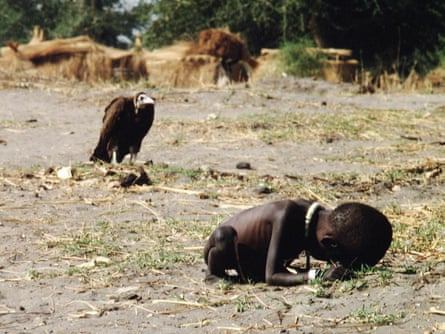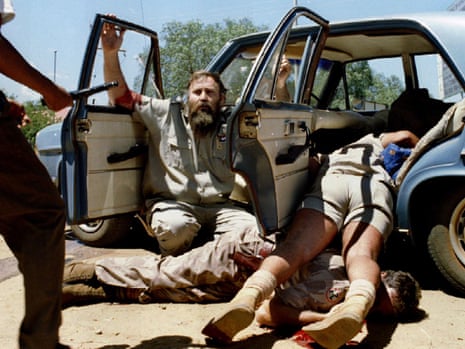Kevin Carter took the picture above of the three AWB members being shot during their abortive invasion of Bophuthatswana just before the South African election. It was a picture that made nearly every front page in the world, the one real photograph of the whole campaign.
Carter ran out of film halfway through the incident, every photographer's nightmare, but still got enough pictures to shock the world. It will probably win the news category of the World Press Photographic Competition to be judged later this year. Unfortunately Carter will not be there to collect his prize. Late on Wednesday night, he killed himself on the outskirts of Johannesburg. The horrors he had witnessed over the years had finally caught up with him. In his line of work, it was often hard to look, let alone photograph.
Carter was only 33, a gaunt, tense, passionate man. Like so many committed photojournalists, for him the picture is the only important thing. He was a second generation Irishman who thrived on the dramatic stories that South Africa, a country of such extremes, has thrown up over the last few decades. After freelancing for most of the international photo agencies, he had finally landed a contract with the Paris-based Sygma organisation and was thought to have finally settled and to be getting to grips with his turbulent life.
Despite being frequently arrested for infringements of the draconian South African prohibitions on reporting, he was always drawn irresistibly to the heart of the conflict. His tumultuous emotional life brought passion to his work but drove him to extremes of elation and depression.
He often said that if he hadn't been a photographer he would have liked to have been a racing driver. He liked living close to the edge.
Starting off as a sports photographer in 1983, he had also been a broadcaster and the photo editor of the Daily Mail in Johannesburg during its short life. What has shocked his family and friends is that he has just had such a successful year. He had won a Pulitzer Prize for his famous photograph of a starving baby being stalked by a vulture in the Sudan. He was also awarded the American Magazine Picture of the Year for the same shot, no mean achievement for a ‘foreigner’.

Along with all the good news was some bad. His best friend, Ken Osterbroek, was killed beside him while covering a gun battle in the Thokoza township outside Johannesburg. His long-standing relationship had also broken up. He leaves behind a six-year-old daughter.
Jimmy Carter, Kevin's father, told the South African Press Association on Thursday that his son always carried around the horror of the work he did. In the end it was too much.

Comments (…)
Sign in or create your Guardian account to join the discussion